In the mid-1930s, Kenneth Burke—fed up with the lumbering pace and bureaucracy of publishing—decided to start his own publishing network. He enlisted several of his buddies to help and, critically, to write books for this new enterprise. He was going to call it "Manuscript Press," or something like that. It flopped. Later in life, he resurrected the idea and, thanks to the new technology of photocopying, sent his unpublished manuscripts all over the place.  If you're lucky, you might even have one. I had a copy of Poetics, Dramatistically Considered sent to me (quite graciously) by the widow of James Sibley Watson, Burke's long-time benefactor.
If you're lucky, you might even have one. I had a copy of Poetics, Dramatistically Considered sent to me (quite graciously) by the widow of James Sibley Watson, Burke's long-time benefactor.
We are in the midst of a miraculous renaissance in Burke studies, judging by the success of recent conferences (such as KB and His Circles at Penn State in 2005), by the emergence of KB Journal, and by the number of excellent books and articles by and about Burke that have been published in the last few years. I use the term miraculous intentionally. I worry that it won't last if we don't support the publishers, editors, and authors who help us make this scholarship public. [Disclosure: I am closely involved with KB Journal, Parlor Press, and some of the books themselves as an author.] KB Journal editors discussed the urgency and opportunity of this moment and decided that we should do whatever we can to draw attention to new books and other scholarship relevant to Burke studies. Our "Reviews" section launched that effort in previous issues. We continue it here with this, a gallery of Burke-authored books that we think KB Journal readers should buy and read. Soon, we will create another book gallery that directs readers to recent books about Burke (there are some fine ones). That scholarship is important as well, and we owe it to each other to read each other's work. In the last five years, we have been lucky to see terrific new books published by the University of South Carolina Press, Parlor Press, the University of California Press, Black Sparrow Books, and others. Books from these publishers help define the future of our scholarship and, importantly, give others hope that a book on rhetoric generally or Burke in particular still has some chance of being published, in spite of the bleak forecast that our presses are dying out. We shouldn't—we can't—let that happen.
In "The Politics of Rhetorical Studies: A Piacular Rite," James Aune recently suggested that the difficulties faced by our publishers are symptomatic of a wider problem: Perhaps we are not speaking or writing to each other as much as we used to, or maybe we are understandably distracted by too much information competing for too little attention. Perhaps we are too bent on tracking down our own implications (to put a Burkish twist on it). Aune writes,
We need to agree on a core of courses and research projects. The social sciences progress by making doctoral dissertations reflect the research project of the advisor; we consistently allow dissertations to reflect the unique interests of the writer. The result is work across the map that does not gather a sustained audience. And this matters. In the last few years we have lost several high quality book series because rhetoricians do not buy each other’s books. And no wonder: if each rhetorician is a specialty onto him or herself, why buy a book outside the specialty? (73; Quarterly Journal of Speech 92.1 [February 2006]: 69-76)
Rhetorician's don't buy each other's books! Aune may be right about that, but I hope the generalization doesn't hold for too long. So, let me just say, "Buy Burke Books!" Here are some of Burke's own. We will add to this book gallery as we go. If you have any suggestions for {Burke] books to list here, let us know. We have provided links, where possible, directly to the publisher's site, where you can sometimes get a better deal and also rest assured that your money goes to the publisher and author of the book rather than to someone who didn't publish it or write it. The list is ordered by date of publication (or pending publication), starting with the most recent. In the Fall 2006 issue of KB Journal, we include Julie Whitaker's introduction and three poems from Burke's Late Poems, 1968-1993.
New Books by Kenneth Burke |
|
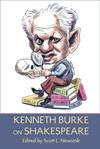 |
Kenneth Burke on ShakespeareKenneth Burke This volume gathers and annotates all of the Shakespeare criticism, including previously unpublished notes and lectures, by the maverick American intellectual Kenneth Burke (1897–1993). Burke’s interpretations of Shakespeare have had an impressive influence on important lines of contemporary scholarship; playwrights and directors have been stirred by his dramaturgical investigations; and many readers outside academia have enjoyed his ingenious dissections of what makes a play function. Artist and illustrator Taylor Jones drew the cover image of Kenneth Burke. |
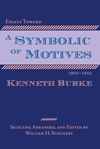 |
Essays Toward a Symbolic of Motives, 1950-1955Kenneth Burke In this long-awaited third volume in his Motivorum trilogy, renowned critic and philosopher Kenneth Burke offers his most precise and elaborated account of his dramatistic poetics. |
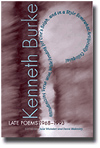 |
Late Poems, 1968–1993Attitudinizings Verse-wise, While Fending for One's Selph, and in a Style Somewhat Artificially Colloquial Kenneth Burke The first publication of over 150 poems from Burke's final decades |
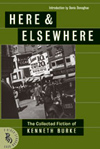 |
Here & Elsewhere: The Collected Fiction of Kenneth Burke Kenneth Burke Here & Elsewhere collects, for the first time in one volume, all of Burke’s fiction. |
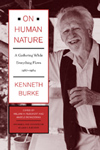 |
On Human Nature: A Gathering While Everything Flows, 1967-1984Kenneth Burke Brings together the late essays, autobiographical reflections, an interview, and a poem by the eminent literary theorist and cultural critic Kenneth Burke (1897-1993). |
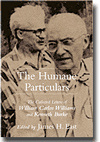 |
The Humane Particulars: The Collected Letters of William Carlos Williams and Kenneth BurkeEdited by James H. East An illuminating conversation between poet and critic |
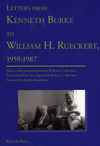 |
Letters from Kenneth Burke to William H. Rueckert, 1959-1987Edited by William H. Rueckert; transcribed from the originals by Barbara L. Rueckert; foreword by Angelo Bonadonna These letters show the development of Burke’s thought in the last thirty or so years of his life, when he remained remarkably productive not only as a correspondent but as a critic and traveling scholar. Rueckert became for Burke both student and “co-conspirator,” with Burke himself playing the roles of teacher, mentor, father, and peer. |


